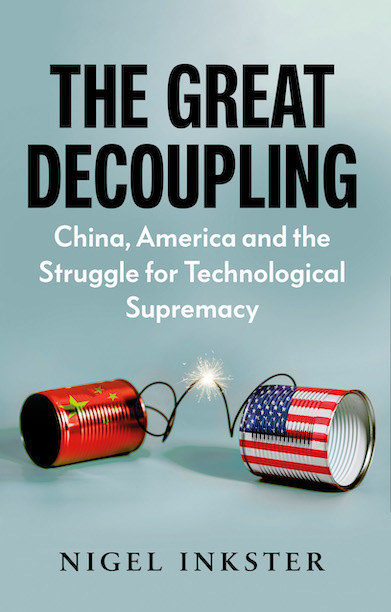Navigating The Great Decoupling: Challenges And Opportunities

Table of Contents
Challenges of the Great Decoupling
The Great Decoupling is not without its drawbacks. Several significant challenges threaten economic stability and growth.
Increased Costs and Inflation
One of the most immediate consequences of the Great Decoupling is increased costs and inflation. Fragmenting supply chains leads to:
- Higher transportation costs: Shipping goods across greater distances naturally increases transportation expenses.
- Increased tariffs and trade barriers: Protectionist policies and trade disputes significantly raise the cost of imported goods.
- Fluctuations in raw material prices: Disruptions to global supply networks make it harder to secure raw materials at stable prices.
This confluence of factors directly impacts consumer prices, fueling inflation and squeezing household budgets. Effective cost management strategies become increasingly crucial for businesses navigating this complex landscape of supply chain disruption. Predicting and mitigating these increased costs is a major challenge requiring sophisticated forecasting and risk management techniques.
Geopolitical Risks and Instability
The Great Decoupling exacerbates geopolitical risks and instability. Regionalization of supply chains leads to:
- Increased risk of trade wars: Nations become more reliant on their own domestic production or regional partners, potentially escalating trade disputes.
- Strained international relations: The reduced interdependence inherent in decoupling can weaken international cooperation and damage existing trade agreements.
- Reliance on less stable trading partners: Businesses may find themselves relying on less predictable or politically stable regions for crucial supplies.
Navigating this heightened geopolitical risk requires a deep understanding of international relations and careful diversification of supply chains to mitigate potential disruptions.
Technological Dependence and Security Concerns
The shift towards regionalization also raises concerns about technological dependence and security:
- Over-reliance on specific countries for crucial technologies: Concentrating technology production in a limited number of nations creates vulnerabilities.
- Data security and intellectual property risks: The transfer of sensitive data and technology across borders presents significant cybersecurity and intellectual property protection challenges.
- Need for diversification and resilience: Building more resilient and diversified technological supply chains is paramount to mitigate these risks.
Addressing these concerns requires proactive measures to enhance cybersecurity, protect intellectual property, and foster technological innovation within diverse geographical locations.
Opportunities presented by the Great Decoupling
While the challenges are significant, the Great Decoupling also presents numerous opportunities for innovation and growth.
Reshoring and Regionalization
The shift away from globalized supply chains offers a chance to:
- Reshore manufacturing and production: Bringing production closer to home reduces transportation costs and lead times in the long run.
- Create jobs and stimulate local economies: Reshoring initiatives create employment opportunities and boost economic activity within local communities.
- Enhance supply chain resilience: Regionalized supply chains are inherently more resilient to global disruptions.
Nearshoring, a variation of reshoring that involves moving production to nearby countries, also offers many of these benefits while maintaining some of the cost advantages of offshoring.
Innovation and Technological Advancement
The need for diversified and resilient supply chains encourages:
- Increased innovation: Competition and the need to develop alternative solutions drive technological advancements.
- Development of new technologies: The search for innovative solutions leads to the creation of new technologies and processes.
- Emergence of new industries and markets: Regionalization opens up opportunities for the creation of entirely new industries and markets.
This increased focus on innovation fuels economic growth and enhances global competitiveness.
Enhanced Sustainability and Ethical Sourcing
The Great Decoupling can contribute to:
- More sustainable supply chains: Regionalization allows for closer monitoring of environmental and social standards.
- Improved transparency and traceability: Shorter supply chains make it easier to track the origin and production methods of goods.
- Support for ethical labor practices: Businesses can better ensure that their suppliers adhere to ethical labor practices.
The opportunity to create more sustainable and ethical supply chains aligns with growing consumer demand for responsible and transparent products.
Conclusion: Navigating the Future of the Great Decoupling
The Great Decoupling presents a complex landscape of challenges and opportunities. While increased costs, geopolitical risks, and technological vulnerabilities are significant concerns, the potential for reshoring, innovation, and enhanced sustainability offers a path towards a more resilient and equitable global economy. Understanding these dynamics is crucial. Proactive strategies are needed to mitigate risks and seize the opportunities presented by this profound economic shift. To learn more about navigating the challenges and harnessing the opportunities of the Great Decoupling, explore resources from organizations like the World Bank and the International Monetary Fund. Successfully navigating this new economic reality requires adaptability, foresight, and a commitment to building more resilient and sustainable supply chains. The future of global trade hinges on effectively managing the Great Decoupling.

Featured Posts
-
 Military Historian Ranks These Realistic Wwii Films Above Saving Private Ryan
May 08, 2025
Military Historian Ranks These Realistic Wwii Films Above Saving Private Ryan
May 08, 2025 -
 Major Xrp Whale Accumulates 20 Million Tokens Market Reaction
May 08, 2025
Major Xrp Whale Accumulates 20 Million Tokens Market Reaction
May 08, 2025 -
 Fieis Dormem Nas Ruas Do Vaticano Em Vigilia Para O Funeral Do Papa
May 08, 2025
Fieis Dormem Nas Ruas Do Vaticano Em Vigilia Para O Funeral Do Papa
May 08, 2025 -
 New Gambit Weapon Honors Rogues Sacrifice
May 08, 2025
New Gambit Weapon Honors Rogues Sacrifice
May 08, 2025 -
 Jayson Tatums Bone Bruise Game 2 Status Uncertain
May 08, 2025
Jayson Tatums Bone Bruise Game 2 Status Uncertain
May 08, 2025
